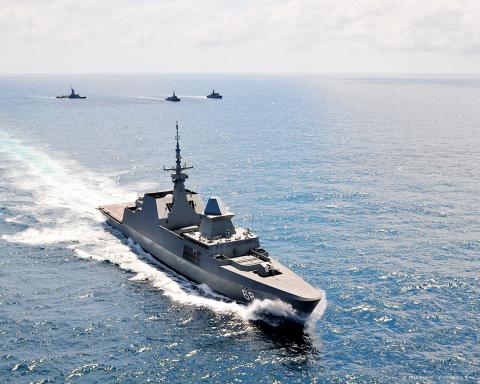The 40-year cooperation between the Republic of China Army and the Singapore Army may be at risk after the city-state sent 70 soldiers to China to an eight-day joint exercise with the People’s Liberation Army (PLA) on Sunday.
The Singaporean soldiers sent to China are from “Project Starlight,” an agreement reached between former president Chiang Kai-shek (蔣介石) and then-Singaporean prime minister Lee Kwan Yew (李光耀) in 1974 and ratified in 1975 under which Taiwan’s military helps train Singaporean troops in the so-called Starlight Exercises.
The government will closely monitor the joint exercises between the PLA and the Singaporean troops, the Ministry of National Defense said.

Screengrab from the Republic of Singapore Navy Web site
Whether the presence of the city-state’s troops at the Chinese military exercise signifies the termination of the Starlight agreement or that Singapore is changing partners from Taiwan to China remains to be seen, the ministry said.
To date, the Singaporean government has not made any changes to the pact and is continuing joint training with Taiwan, it added.
The ministry said it would try to ascertain whether the exercises with China are a one-off event, or if they represent the beginning of normalized joint military training between the two countries.
Ministry officials said that while the Singapore Army joined anti-terrorism exercises with China in 2009 and 2010, there was a significant difference between those drills and a string of recent ones.
Ministry officials said there has been a subtle shift in Singapore’s policy that has seen its army increase dialogue with its Chinese counterpart. The two sides conducted a joint military exercise in April, another in August and in September, the Singapore Army sent a company of troops to conduct joint exercises in the PLA’s Nanjing Military District, they said.
In addition to the increasing familiarity between the Singaporean and Chinese armies, the ministry said the Republic of Singapore Navy has also been reaching out to its Chinese counterpart.
According to the ministry, the Republic of Singapore Navy had sent one of its Formidable-class frigates — a derivative of the French Lafayette class — to attend an exercise with China, adding that as the Formidable-class is an upgraded Lafayette derivative equivalent to the Republic of China Navy’s Kang Ting-class, this interaction could affect future upgrades of the Taiwanese frigates.
The RSS Formidable attended a multinational naval exercise off Qingdao, China, in April, while the RSS Steadfast visited the People’s Liberation Army Navy South Sea Fleet.
The ministry said the nation’s Kang Ting-class frigates are nearing the time for crucial upgrades, which include increasing their vertical missile launch systems and replacing the MIM-72 Chaparral missiles they carry with domestically manufactured Sky Sword II missiles.
The Sky Sword II anti-aircraft missile system can be carried by platforms across all the military’s branches. The Chaparral missiles were originally made to be surface-launched anti-aircraft missiles and were developed by the US Army.
The possibility of China increasing its familiarity with Lafayette-class ships through interaction with Singapore’s Formidable-class vessels is a huge factor in determining if Taiwan’s navy will maintain its current upgrade plans or seek alternatives, the ministry said.

US President Donald Trump yesterday announced sweeping "reciprocal tariffs" on US trading partners, including a 32 percent tax on goods from Taiwan that is set to take effect on Wednesday. At a Rose Garden event, Trump declared a 10 percent baseline tax on imports from all countries, with the White House saying it would take effect on Saturday. Countries with larger trade surpluses with the US would face higher duties beginning on Wednesday, including Taiwan (32 percent), China (34 percent), Japan (24 percent), South Korea (25 percent), Vietnam (46 percent) and Thailand (36 percent). Canada and Mexico, the two largest US trading

China's military today said it began joint army, navy and rocket force exercises around Taiwan to "serve as a stern warning and powerful deterrent against Taiwanese independence," calling President William Lai (賴清德) a "parasite." The exercises come after Lai called Beijing a "foreign hostile force" last month. More than 10 Chinese military ships approached close to Taiwan's 24 nautical mile (44.4km) contiguous zone this morning and Taiwan sent its own warships to respond, two senior Taiwanese officials said. Taiwan has not yet detected any live fire by the Chinese military so far, one of the officials said. The drills took place after US Secretary

CHIP EXCEPTION: An official said that an exception for Taiwanese semiconductors would have a limited effect, as most are packaged in third nations before being sold The Executive Yuan yesterday decried US President Donald Trump’s 32 percent tariff on Taiwanese goods announced hours earlier as “unfair,” saying it would lodge a representation with Washington. The Cabinet in a statement described the pledged US tariffs, expected to take effect on Wednesday next week, as “deeply unreasonable” and “highly regrettable.” Cabinet spokeswoman Michelle Lee (李慧芝) said that the government would “lodge a solemn representation” with the US Trade Representative and continue negotiating with Washington to “ensure the interests of our nation and industries.” Trump at a news conference in Washington on Wednesday announced a 10 percent baseline tariff on most goods

THUGGISH BEHAVIOR: Encouraging people to report independence supporters is another intimidation tactic that threatens cross-strait peace, the state department said China setting up an online system for reporting “Taiwanese independence” advocates is an “irresponsible and reprehensible” act, a US government spokesperson said on Friday. “China’s call for private individuals to report on alleged ‘persecution or suppression’ by supposed ‘Taiwan independence henchmen and accomplices’ is irresponsible and reprehensible,” an unnamed US Department of State spokesperson told the Central News Agency in an e-mail. The move is part of Beijing’s “intimidation campaign” against Taiwan and its supporters, and is “threatening free speech around the world, destabilizing the Indo-Pacific region, and deliberately eroding the cross-strait status quo,” the spokesperson said. The Chinese Communist Party’s “threats